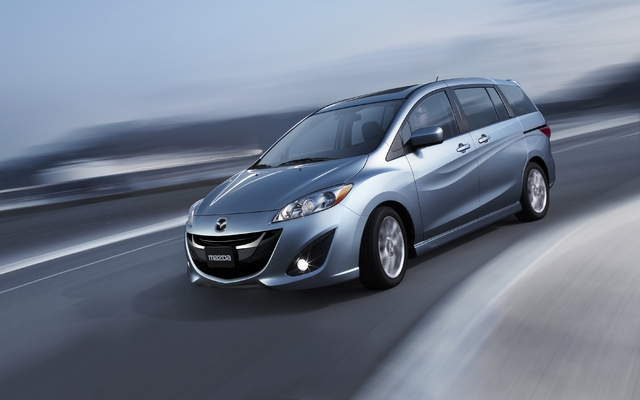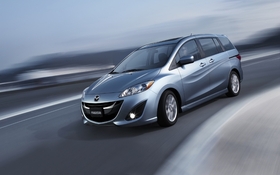2012 Mazda5: The Smartest Car I Don't Want

| Strong points |
|
|---|---|
| Weak points |
|
I’m young. Quite young. If I was a car, I’d be trapped in that awkward phase of old enough to be cheap, but not old enough to be cool. I would be a Yugo. This should tell you everything you need to know about my stance on minivans.
And who can blame me? What sort of red-blooded young man wants to slide the loading bay doors open on his own modern-day ark and deposit writhing, dirty, smelly offspring into any one of the six available passenger seats?? Not this guy, that’s who. By my own (and all that know me) admission, I’d happily pilot my diesel-guzzling Hummer H1 to soccer practice while explaining the merits of a CTIS system to my prodigal and obviously mechanically gifted hypothetical son before I cut a cheque for something with sliding rear doors.
This is precisely why I struggle so with this particular vehicle, the 2012 Mazda5. Having taken a one year hiatus (sort of), the Mazda5 has returned (not that it really ever left) wrapped in all-new sheetmetal and perched atop an all-new platform. Already the smallest vehicle of its type available to the North American consumer, the new Mazda5 looks to improve the vehicle’s image by replacing the old model’s slab-sided silhouette with a much more shapely and curvaceous body that’s akin to trading Victoria Beckham for Kim Kardashian. Borrowing heavily from the Mazda3’s design (which should come as little surprise since they share the same underpinnings) the Mazda5’s front end is, at first blush, almost identical to that of its sedan sibling. There appears to be the same smiling grille, the same slender light arrays, and the same canard-inspired lower valance that you get on the Mazda3, all of which wraps around to the same fender silhouette that rises over the front wheelarch and terminates shortly therafter. But that’s where the Mazda5 gets interesting. With a much larger expanse of sheetmetal to play with, it’s obvious that Mazda’s designers wanted to demonstrate precisely how serious they are about their lauded Nagare design language, and that comes out in the series of sweeping creases that are stamped into the Mazda5’s flanks like a brand. Handily adding some much-needed rigidity to the door skins, the creases look quite good, if I do say so myself, and although the overall effect is quite effeminate, it only lends to the design’s attractiveness. Wrapping around the rear of the car, the curves mimic the front fender’s rising motion over the rear wheelarch before curving around to form the lower edge of the shapely and familiarly slender taillights.
Open any of the shapely doors, and you’re instantly greeted by an interior that’s both so stereotypically Mazda and yet so at odds with what I’ve come to expect from Mazda. All the same colours and textures are here, from the nice pebbly finish of the dashboard to the flat black plastic of the centre console to the ubiquitious glowing red backlighting of the controls… But, this time, there’s no frustratingly tiny fly in the ointment. With pretty much every other Mazda product, there’s been one or two things that have been so small and insignificant that they almost haven’t been worth mentioning, but have almost been more frustrating as a result. In the Mazda3 it is the utterly useless navigation screen and distracting second-tier dashboard display, while in the RX8 it’s the beat-your-hand-up rotary-shaped shifter and toaster oven/centre console. But there’s nothing like that in the Mazda5. Well experienced with the previous model and much appreciative of its unique features like the under-seat storage, well-placed interior rear handles, and simple fold-flat seating, I was pleasantly surprised at how familiar the new one felt; all those great features have been carried forward without fail. And all the other features seem to be even better than before, be of the higher quality of assembly seen in the centre console and controls, or more logically laid out than in the old Mazda5.
Of course, it goes without saying that it’s also substantially more engaging to drive than the average minivan. First off, the seating position isn’t the same recliner-esque perch you’ll find in most minivans; the front seats has some real support to them. Obviously, the inclusion of the available six-speed gearbox helps the car feel vastly more sporting than any other minivan, even if the last three ratios feel so close in ratio as to be superfluous. And the 2.5-litre powerplant provides enough hustle to satisfy most, but really excels at lower speed where it can exploit its relatively plentiful torque curve. The suspension equipment, most of it cribbed from the Mazda3, is expectedly good, with the extra weight over the rear axle actually feeling like it improves the overall ride compared to the sedan. Sure, it’s not quite as sticky and the limits are predictably lower, but over larger undulations the rear end doesn’t feel like it’s getting tossed around quite as much, meaning things like speed bumps need not be taken at five kilometers an hour. With the exception of the third row, each seating position gives great visibility and unparalleled levels of room in a vehicle of this size, and the roll-down side windows are still a much appreciated feature only now catching on with the competition.
So, will I be buying one? Hell no. Why would I? I’ve got no kids, and have no plans to change that situation any time soon. Short of increasing my propensity for acting as designated driver, I’ve no need for a vehicle of this ilk. But, if the situation was different, and I was looking for safe, reliable, practical transportation that wouldn’t be total character assassination with my male friends, the answer would be very different. It’s quite simply everything I could picture myself needing. Having used it to cart around some freshly painted body panels for an old car I’m restoring, I came to appreciate the Mazda5’s commodious cargo bay and easily folded seats. Likewise, I found its spacious and well carried-out interior to be quite relaxing on my longer drives through Vancouver’s eternally rain-slicked and depressingly overcast landscape. In short, it’s just a bloody smart vehicle that’s hard, if not impossible, to fault… try as I might.











